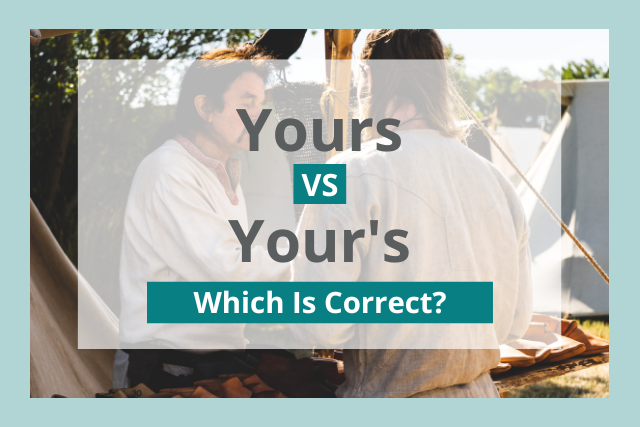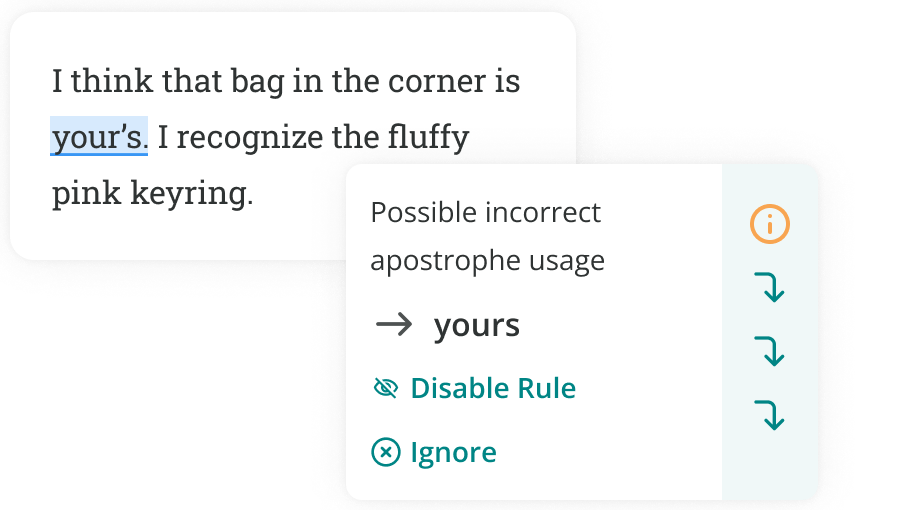
One of the most common grammar mistakes is adding an apostrophe where none is needed.
So do you need an apostrophe to spell yours?
The short answer is no—you should never include an apostrophe in the word yours. Even native English speakers often make this mistake.
This article will explain why there’s no apostrophe in yours and help you remember whether to use yours or your’s.
What’s the Difference Between Yours vs Your’s?
Yours is a second person possessive pronoun. It indicates that something is owned by the person you’re addressing, both for second person singular and second person plural.
For example, you might say, “This pencil is yours, not mine.” This sentence means the pencil belongs to the person being addressed, not the person speaking.
Your’s with an apostrophe isn’t a real word, it’s just an incorrect spelling. If you accidentally add an apostrophe to the correct spelling, yours, your writing will look less professional and might confuse your reader.

When to Use an Apostrophe: Yours vs Your’s
It might feel like you need to use an apostrophe in your’s, because adding an apostrophe and an S is such a common convention in the English language.
After all, when you want to convert a proper noun into a possessive form, you usually add an apostrophe and an S to the end of the name. For example, the correct possessive form of John is John’s.
The reason yours doesn’t need an apostrophe is because it’s already a possessive pronoun to begin with.
Yours is akin to the other possessive pronouns mine, his, hers, ours, and theirs, which correspond to the personal pronouns I, he, she, we, and they.
None of these possessive forms require apostrophes, whether or not they happen to end with an S, because they’re already possessive.
One helpful trick for remembering whether or not you need an apostrophe in yours is to imagine switching out the word yours for the opposite possessive pronoun, mine.
It would be grammatically incorrect to use an apostrophe in the word mine, so you don’t need to use one in yours either.
Examples of Yours in a Sentence
Let’s look at some examples of yours in sentences from popular English books.
“What really knocks me out is a book that, when you’re all done reading it, you wish the author that wrote it was a terrific friend of yours and you could call him up on the phone whenever you felt like it.”—J.D. Salinger, The Catcher in the Rye
“You are every reason, every hope, and every dream I’ve ever had, and no matter what happens to us in the future, everyday we are together is the greatest day of my life. I will always be yours.”—Nicholas Sparks, The Notebook
“Do not let the hero in your soul perish in lonely frustration for the life you deserved and have never been able to reach. The world you desire can be won. It exists… it is real… it is possible… it’s yours.”—Ayn Rand, Atlas Shrugged
“And then there are books like An Imperial Affliction, which you can’t tell people about, books so special and rare and yours that advertising your affection feels like betrayal.”—John Green, The Fault in Our Stars
“My soul will find yours.”—Jude Deveraux, A Knight in Shining Armor
“Always go to other people’s funerals, otherwise they won’t come to yours.”—Yogi Berra, When You Come to a Fork in the Road, Take It!
“I’d rather die my way than live yours.”—Lauren Oliver, Delirium
Now you know the difference between yours vs your’s.

If you’re not sure whether you need to use an apostrophe or not, you can always run your work through ProWritingAid, which will point out grammatical errors and help you choose the correct word.


